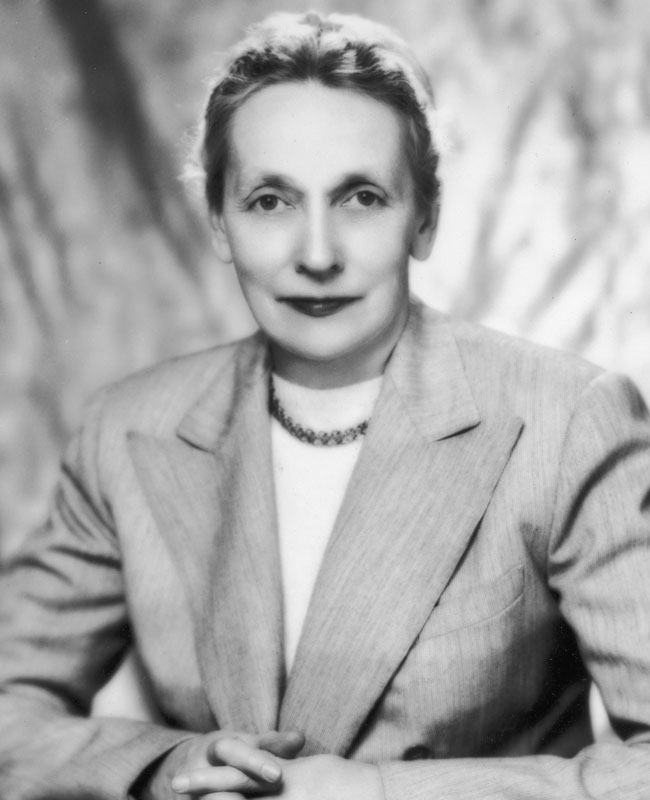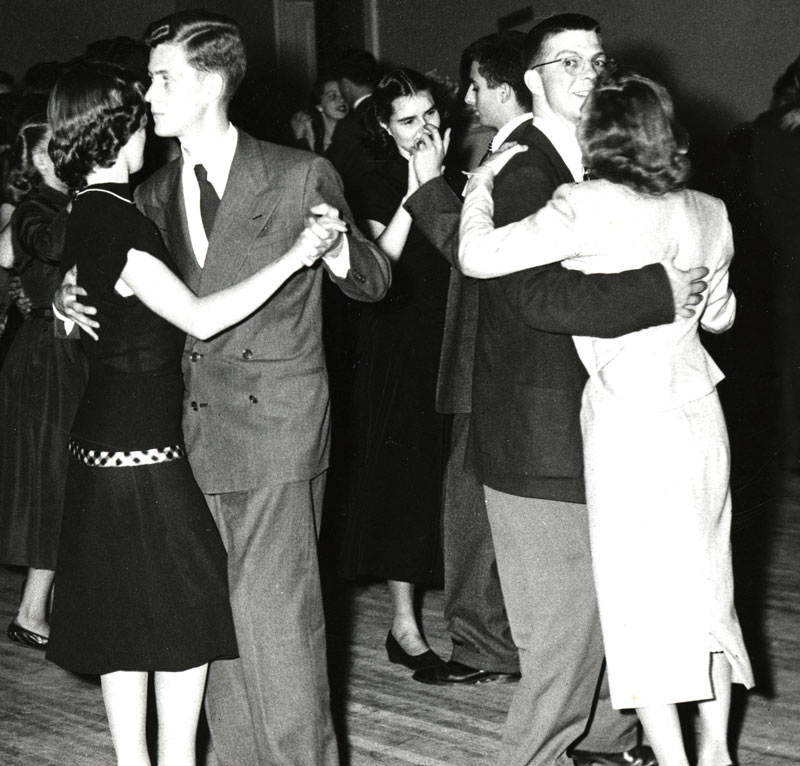The Tizzy at Vassar: President Sarah Gibson Blanding's Infamous Sex Talk

So many iconic events marked my four years at Vassar in the early 1960s. We wondered, in October 1962, if we would survive imminent nuclear attack during the days of the Cuban missile crisis. We remember exactly where we were during the terrible afternoon of President Kennedy’s assassination in November 1963. We watched the civil rights movement turn violent in the summer of 1964. And we had our very own iconic event: Vassar president Sarah Gibson Blanding’s sex speech (or, more accurately, no-sex speech), delivered in April 1962 at Convocation in the Vassar Chapel.
That night, some 1,530 Vassar “girls” (Vassar was still a women’s college then), streamed into the chapel, seating ourselves by class. The hum of chatter died down when Miss Blanding, seated on the dais, rose to speak. After dispensing with some routine business, she then drew herself up and announced that she had something important to talk to us about—sex. Her message, boiled down, was that “decent” girls, Vassar girls, don’t have sex before marriage. Students who chose to engage in premarital sex, she said, should withdraw from the college.
That Miss Blanding would choose to talk about sex in an all-college convocation was astonishing in itself, but few of us, raised in the moral environment of the 1950s, in our kneesocks, pleated skirts, and Shetland sweaters, would have found her message in conflict with what we had been hearing all our lives. Nor could we have predicted the shock that lecture generated—on campus and beyond—in the spring of 1962. It was to have the effect of an earthquake on the Vassar campus over the next week. A sheltered girl, I had no idea what a tempest I would find back at Noyes Hall, where a clutch of freshmen, sophomores, and juniors were gathered in the appropriately named “passion pit,” the circular couch in the living room. “It’s an outrage!” shouted one student. “It’s none of her business,” said another.
The following week, the Miscellany News took the unusual step of publishing—with “no outside circulation”—a supplement to its weekly edition that both the Misc and the administration felt “of value and importance only to the Vassar community.” (Not true, as it turned out.) The supplement reported on a survey that the Misc and the Comment, another student publication, had distributed asking several questions about students’ response to Miss Blanding’s speech. Of the 1,040 students who participated in the survey (almost two thirds of the student body), slightly more than half agreed with Miss Blanding’s moral position. Said one student in support of chastity, “This college would not be respected if it did not take a stand for the dignity of young women … premarital relations do not signify personal freedom.”
Those students who objected to the speech expressed resentment that Vassar, a “liberal” arts institution that prided itself on the development of individual responsibility and critical thinking, should not trust students to use their own judgment about their private lives. Said one, “Vassar no longer stands for the freedom of each student to define her own moral code and to conduct her private life within a set of social relations.” One student opined that if chastity was to be a requirement for Vassar students, if the college was to become the “Poughkeepsie Victorian Seminary for Young Virgins,” then it should be explicitly stated in the admissions materials. She added that the student body might be a lot less interesting in the future. Everyone was shocked at Miss Blanding’s assertion that those who had premarital sex should withdraw from the college; two respondents said they planned to leave the school.
A month went by and the sex-speech tempest was beginning to die down on campus when, in early May, the New York Herald-Tribune broke the story after a copy of the Misc supplement “became available,” as the Trib put it. Overnight, Vassar’s news became national news as newspapers across the country, from Seattle to Rochester, carried stories on Miss Blanding’s speech and the ensuing “uproar” at the school. The press had a field day with the headlines: “The Idea! Say the Vassar Girls” (New York Post), “Vassar Scolds Wild Students” (Louisville Courier-Journal), “The Tizzy at Vassar” (Hartford Courant), and “Sex Hex Vexes Vassar” (Boston Herald).

The part of the story that shocked readers was not that 52 percent of Vassar students supported Miss Blanding (a finding that would be incomprehensible to contemporary students), but that 48 percent of the students—including eight percent who were undecided—did not support her. Some editorials speculated that boys would come to date Vassar girls for the “wrong reasons,” others that Vassar girls were “male starved desperate females.” Everyone had a theory about who was to blame for the moral decline among American youth. Some thought college girls were at risk because they postponed marriage until after college, and were trained to think for themselves with no means for gaining experience. Professors teaching the “fashion of the times” allowed the girls to think they could “create standards according to their own whim.” One alumna thought that “To women who were educated in the lingering shadow of the great feminists [of the first wave of feminism in the early 20th century], the tolerance of many college girls for indecent behavior—and also their pursuit of early marriage, however decent—represent surrender to masculine standards and masculine dominance.”
Our cohorts at other colleges weighed in with their own perspectives on premarital sex. A Washington Post survey of students at Columbia, Cornell, Harvard, Princeton, Wesleyan, and Yale (interestingly, it did not survey women’s colleges) yielded the majority opinion that matters of sex “are a student’s private business.” Berkeley’s Daily Californian added that sexual experimentation was okay for boys but not for girls. The Cornell Sun speculated that the speech was made to “pacify alumnae and those parents who do not have much faith in the maturity of their daughters.” Novelist and sports writer Frank Deford, then a senior at Princeton, wrote a sendup of the Vassar story, a one-scene play titled “Miss Blanding Builds Her Dream Girl” for the Princeton student newspaper.
Soon the Vassar story had a global audience. The Vassar Library archives contain clippings of coverage in Italian and French newspapers along with one from the Chinese-language China Tribune in New York City. The London Sunday Times commented wryly, “Students in American colleges think they have a right to do anything except join the Communist Party.” Margaret Mead stepped into the conversation in a Redbook piece, noting that the central issue about premarital sex relations is the risk of producing illegitimate children—children who from the start are denied the protection every human society has found it necessary to give. Eleanor Roosevelt in her syndicated column warned, “Freedom is a natural demand of youth, but it does require preparation.”
Miss Blanding received a flood of fan mail from parents and alumnae. In subsequent interviews, including an article in the November 1962 issue of McCall’s titled “The Day I Spoke Off the Cuff to the Girls of Vassar,” she referred to the number of magazine articles tending to promote promiscuity. Perhaps she was reacting to the work of Helen Gurley Brown, whose book Sex and the Single Girl would be published that year, 1962, and who was already promoting her brand of feminism (defined by freedom of sexual expression) for single girls in her magazine, Cosmopolitan.
Miss Blanding had the last word on sex and the Vassar girl in 1962, but it was almost the last word from an era and an ethic that was evaporating just as my classmates and I walked out of Taylor Gate and into the modern age.
Selby Fleming McPhee’s family memoir Love Crazy was published in 2013. A version of this essay appeared in the Class of 1965’s 50th Reunion book.
